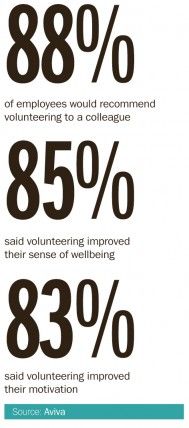Developing a charitable giving or philanthropic initiative is not just good for a company’s reputation with customers, but can also have spin-off benefits for employees and employers. On a practical level, getting people engaged in non-work initiatives can help foster a sense of team spirit, as well as breaking down silos in organisations.
“Encouraging employees to take part in a community service can lead to greater collaboration within multi-generational, diverse workforces,” says Srimathi Shivashankar, associate vice president, diversity and sustainability, at global IT services firm HCL Technologies. “Working towards a good cause beyond the four walls of the office can promote a sense of camaraderie and unity, as well as social responsibility.”
Some companies are already making efforts to engrain such initiatives in their company culture. Outsourcing business TELUS International runs an annual “day of giving” where its employees have the opportunity to put something back into the communities where they live and work.
“Each year, in every site, we donate one of our weekend days to support our local communities, by building and refurbishing schools, orphanages and so on,” says Gregoire Vigroux, European marketing director at TELUS International Europe. “It is an invaluable chance for people to develop skills outside their current role and to do challenging work alongside colleagues they would not otherwise meet. The president of TELUS International ends up hammering nails alongside a contact centre agent.”
Where employees are involved in companywide initiatives to raise money for charity – through seeking sponsorship for an event, perhaps – there can be other benefits. John Styring, chief executive of Igloo Books, says individuals tend to feel better about their job, as well as getting fitter and deriving a huge amount of personal satisfaction. “The benefits of team-bonding, working together, and staying fit and healthy are a great reason for businesses to take part in employee charity-raising activities,” he says.
RECRUITMENT AND RETENTION
A major benefit of such a strategy, whichever form it takes, is that it can help an organisation retain and attract talent into the business. This is particularly the case for younger workers, who are often looking for employers to have an ethical stance with which they can connect.
People expect more than just a place to work now – motivations are changing and charitable schemes are more important than ever
Natalie Green is public relations manager at technology firm Postcode Anywhere, and refers to herself as “a twenty-something who could be described as a Millennial”. She was particularly attracted to her current employer by its philanthropic approach. “In the three years I have worked here, I have been involved in all sorts of activities, from dragon boat racing for Cancer Research UK to entertaining the elderly at the local nursing home,” she says. “The best part is that everyone gets involved, from the trainee members of staff right up to the CEO.”
Employee benefits firm Thomsons Online Benefits believes its charitable initiatives have helped to give it the edge in the hugely competitive market for technology professionals. These include the Thomsons Thames Challenge, a weekend-long event which saw staff row, run and ride from Oxford to London, and raised more than £115,000 for Great Ormond Street Hospital Children’s Charity.
“People expect more than just a place to work now – motivations are changing and charitable schemes are, encouragingly, more important than ever for many,” says Chris Bruce, Thomsons Online Benefits’ managing director and co-founder. “It’s about doing something that’s not just for themselves, while making a contribution to the local community and supporting others.”
Increasingly, organisations are now starting to shape specific charitable projects themselves, giving employees the opportunity to take part in initiatives, often in work time, either through volunteering days or outreach programmes. “These programmes allow the employees to feel more actively engaged,” says Jo Arden, head of strategy at creative agency 23red. “Multiply that up to a whole-staff level, and you have something which transcends what it contributes and is more about corporate culture and a feeling of shared ambition to make positive change.”
Getting more directly involved with charities can have other benefits, for the charities themselves, employees and even management in corporate businesses, says Ian Joseph, chief executive of Trustees Unlimited and managing director of Russam GMS. “Charities can really benefit from having experienced professionals from commercial companies join their boards, but the learning goes both ways,” he says.
“People from the private sector are often amazed at how complicated running a charity is and they learn the meaning of what a true lean organisation looks like, often delivering essential work with very limited resources. Employees who are engaged in such programmes often outperform their non-trustee colleagues, have lower levels of absenteeism and stick with a firm for longer. Initiatives like this really are a win for everybody.”
RECRUITMENT AND RETENTION

